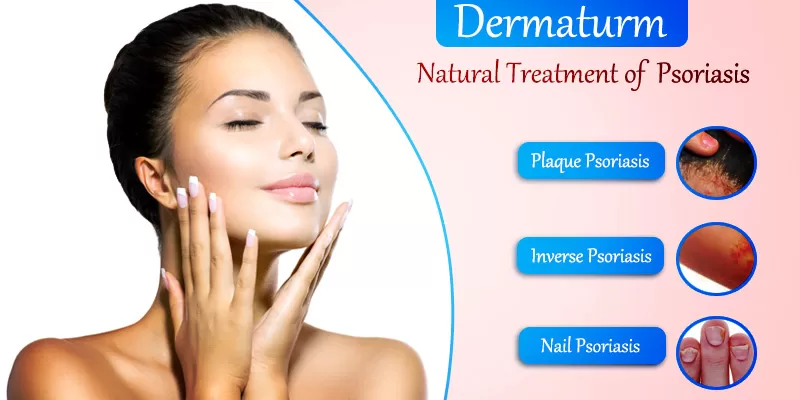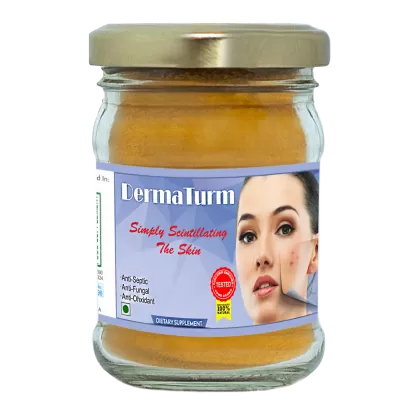Psoriasis – A Painful Skin Condition
Psoriasis is an autoimmune disease. It accelerates the buildup of cells on the surface of the skin forming painful red patches that are also itchy. The skin cells in a patient suffering from psoriasis multiply 10 times faster than normal. Psoriasis can be attributed to a variety of factors like genetics, emotional stress and strep infection, to name a few.
Types of Psoriasis
1) Plaque Psoriasis- This is the most common type of psoriasis. It causes inflamed skin that is covered in silvery scales. It shows up typically on the elbows, knees, scalp and lower back.
2) Guttate Psoriasis- This form of psoriasis typically occurs in children. It shows up in the form of small red spots and can happen due to strep throat, stress, skin injury or due to certain drugs. It shows up typically on the trunk, upper arms, thighs and scalp. This kind of psoriasis can go away in some time without any medication.
3) Inverse Psoriasis- This form of psoriasis appears in the form of shiny red patches without the silvery scales. It typically appears in the armpits, skin folds under the breasts, genitals and buttocks and the groin area. A yeast growth may worsen the condition.
4) Pustular Psoriasis- This type of psoriasis is more common amongst adults and shows up in the form of pus filled bumps that are surrounded by inflamed skin. They show up on a single area of the body like hands or feet and can cause serious symptoms like fever, muscle weakness, nausea, chills etc. Pregnancy, infection or stress may trigger this.
5) Erythrodermic Psoriasis- This is the most serious form of psoriasis that causes a widespread inflamed skin which is itchy and can burn and start to peel. There may also be some alterations in the temperature of the patient’s body.
6) Nail Psoriasis- This form of psoriasis happens around the nails. It causes nails to become soft and painful with changes in nail color as well.
7) Psoriatic Arthritis- This happens when a patient is suffering from both psoriasis and arthritis. It results in painful joints that are stiff and swelling in the fingers and toes.
Causes of plaque psoriasis which is the most common variety of psoriasis are:
- Genetics – It is believed that plaque psoriasis can be a disease that is passed on from one generation to the next. It is an autoimmune disease in which the body starts to produce antibodies that target the healthy cells.
- An injury or severe sunburn may also trigger plaque psoriasis as a reaction.
- Certain medications that do not agree with the body can also bring about plaque psoriasis.
- High stress levels are sometimes known to trigger plaque psoriasis.
How does curcumin help in treating psoriasis?
Curcumin has always been used as a natural remedy to treat skin problems. It has several properties that make it a super healer. Some of these are as follows:
- Curcumin has potent anti-inflammatory properties that stops certain proteins in the body from causing inflammation. These proteins are called nuclear factor kappa B proteins. Curcumin stops the functioning of these proteins and as a result slows down the inflammation process.
- Curcumin is a strong antioxidant that shows more potency than vitamins C and E. It increases the level of enzymes that reduce oxidative stress by controlling the production of Reactive Oxygen Species.
- Curcumin is a known antimicrobial agent. It acts as an antiseptic, antibacterial, and antiviral. This helps in soothing skin that is afflicted by psoriasis.
- Curcumin is helpful in treating autoimmune diseases but controlling immune responses that are not regular. The immune cells that end up causing psoriasis are T cells. These cells start producing certain proteins that cause the skin cells to multiply rapidly causing psoriasis. Curcumin has the ability to control these cells.
Bagdara Farms has just the supplement for you in case you are battling chronic psoriasis. This supplement is known as Dermaturm and it is specifically made to help alleviate skin conditions like psoriasis. ½ a teaspoon of Dermaturm can be mixed with a pinch of black pepper and hot water and consumed once a day to ward off painful skin conditions like psoriasis.
How does curcumin help in treating psoriasis?
Curcumin has always been used as a natural remedy to treat skin problems. It has several properties that make it a super healer. Some of these are as follows:
- Curcumin has potent anti-inflammatory properties that stops certain proteins in the body from causing inflammation. These proteins are called nuclear factor kappa B proteins. Curcumin stops the functioning of these proteins and as a result slows down the inflammation process.
- Curcumin is a strong antioxidant that shows more potency than vitamins C and E. It increases the level of enzymes that reduce oxidative stress by controlling the production of Reactive Oxygen Species.
- Curcumin is a known antimicrobial agent. It acts as an antiseptic, antibacterial, and antiviral. This helps in soothing skin that is afflicted by psoriasis.
- Curcumin is helpful in treating autoimmune diseases but controlling immune responses that are not regular. The immune cells that end up causing psoriasis are T cells. These cells start producing certain proteins that cause the skin cells to multiply rapidly causing psoriasis. Curcumin has the ability to control these cells.
Bagdara Farms has just the supplement for you in case you are battling chronic psoriasis. This supplement is known as Dermaturm and it is specifically made to help alleviate skin conditions like psoriasis. ½ a teaspoon of Dermaturm can be mixed with a pinch of black pepper and hot water and consumed once a day to ward off painful skin conditions like psoriasis.
Information Credit : https://www.ncbi.nlm.nih.gov/pubmed/23316365



